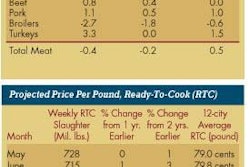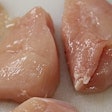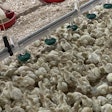In the wake of Burger King's recent announcement that the company would begin buying eggs and pork from suppliers that don't confine their animals in cages and crates, Colorado State Animal Science Professor Temple Grandin put her finger on a central tenet on which animal welfare activist strategy is based. The New York Times quoted Grandin as saying, "When the big boys move, it makes the entire industry move."
While Burger King's initial targets in its new welfare program may seem modest, the shift will put pressure on other restaurants and food retailers to adopt similar standards.
Burger King's decision reportedly came after extensive dialogue with the Humane Society of the United States and independent discussions with People for the Ethical Treatment of Animals. Here are the results:
Burger King said it has begun purchasing 2 percent of its eggs from producers that do not confine laying hens in battery cages and will more than double the percentage of cage-free eggs it is using to 5 percent by the end of the year. The company also has implemented a purchasing preference for cage-free eggs.
It has started purchasing 10 percent of its pork from producers that do not confine breeding pigs in gestation crates. The volume of pork purchases coming from gestation crate-free producers will double to 20 percent by the end of the year. The company also has implemented a purchasing preference for pork from producers that do not confine breeding sows in gestation crates.
Also, Burger King has implemented a preference for producers that use controlled atmosphere stunning in slaughter plants.
Before you use the "c" word (cave) about Burger King's action, keep in mind that your company could be the next target. The activist community has become quite adept in isolating its corporate prey and then focusing and applying pressure for years, if necessary, to get its way. The activists complain about coordination in corporate public relations to blunt their attacks, but frankly the industry's efforts pale in comparison. At the same time that the activists whine about corporate interests using a "good cop, bad cop" strategy in self defense, the more militant activists take an anything goes to achieve our ends' strategy including misrepresenting the truth and in some cases breaking the law and then a more reasonable seeming member of the activist community collects the concessions from the corporate target.
The Times story picked up on some of the language from the press releases circulated by the U.S. Humane Society, and other activists, and called Burger King's move "historic." In fact, events may have actually caught up with activist rhetoric in this case. Not only was Burger King's announcement momentous, it capped off a string of victories for the activists. For example, after successful HSUS-led ballot initiatives banning gestation crate confinement in Arizona and Florida, Smithfield Foods and Maple Leaf Foods announced that they are phasing out their use of gestation crates. And, Wolfgang Puck announced a program to improve animal welfare in his supply chain. And after the HSUS launched its No Battery Eggs' campaign, a number of foodservice providers and schools have eliminated or reduced their use of eggs from hens confined in battery cages.
There is a bigger trend in play here. It is the rise in the influence of pressure groups and a concomitant decline in the use of conventional political and legal avenues to achieve change. At the same time, the whole area of social responsibility or social consciousness is becoming more important to consumers.
This change is reflected in the business policies of Whole Foods Market, the natural and organic foods supermarket. It has created the Whole Trade Guarantee, a buying program designed to insure that products from developing countries meet a range of socially responsible criteria. The criteria include more money for producers, better wages for workers and that products are produced with sound environmental practices.
Burger King's shift in its practices is just the tip of the iceberg. Producers of animal products, indeed, producers of any type products, are facing new realities in the 21st century. Producers of poultry already know this. But the shift in Burger King's purchasing criteria really puts an exclamation point on the matter.






.jpg?auto=format%2Ccompress&fit=crop&h=167&q=70&w=250)











